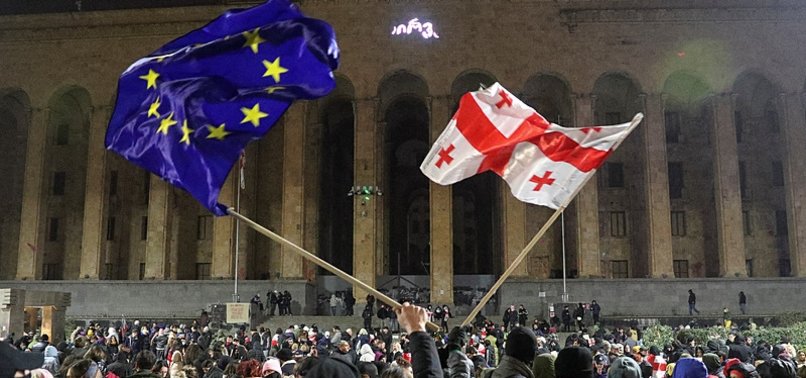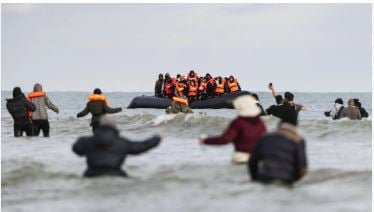
TBILISI, Dec 8 (NNN-AGENCIES) — Thousands of protesters marched in the Georgian capital Tbilisi Saturday for the 10th day of rallies sparked by a disputed election and the government’s decision to shelve EU accession talks.
Demanding fresh elections and a return to European integration, the demonstrators headed towards parliament, undeterred by a police crackdown on pro-EU protesters and attacks on the opposition.
The Caucasus nation has been engulfed in turmoil since the governing Georgian Dream party declared victory in a disputed October 26 election.
The government last week said it would suspend talks to join the European Union, sparking a fresh wave of demonstrations. Its critics accuse it of creeping authoritarianism and of steering the country back towards Russia.
Georgia’s pro-Western President Salome Zurabishvili — at loggerheads with the ruling party — said on social media she had had “in-dept discussion” with the US president-elect Donald Trump and French counterpart Emmanuel Macron in Paris.
She said they had discussed the “stolen election and extremely alarming repression against the people of Georgia.
“Underscored the need for a strong US,” she added. “The Georgian people have a friend in Donald Trump.”
Ukraine’s leader Volodymyr Zelensky — whose country has been fighting a Russian invasion for almost three years — said Saturday he fully backed Georgia’s anti-government protesters.
Zelensky urged Tbilisi to stop “surrendering” to Moscow in a meeting with Zurabishvili in Paris.
He has warned of Russian influence in Georgia for months.
Zurabishvili has denounced widespread fraud in October’s parliamentary polls, branding the freshly elected legislature and government “illegitimate”.
Blowing horns and whistles, pro-European protesters marched Saturday from Tbilisi State University towards parliament, blocking one of the city’s main traffic arteries.
As on previous nights, some demonstrators banged on the metal barriers blocking the parliament’s entrance. Others pointed laser beams at the building and the police blocking the adjacent streets.
Some demonstrators held signs reading “We demand free and fair elections” and “Free all unjustly arrested,” as calls for stronger international backing grew louder among the protesters.
Independent television station Pirveli reported that dozens of masked men had severely beaten its journalists.
Police officers stood by without intervening during the incident near the protest venue.
The opposition alliance, For Change, released CCTV footage showing the masked men raiding its office and badly beating opposition figure Koba Khabazi.
The Georgian Dream government’s security forces had faced persistent accusations of deploying plainclothes security agents to target and attack political opponents.
The crackdown has triggered outrage at home and mounting international condemnation.
Officers have made hundreds of arrests, including 48 at a protest on Friday. The country’s rights ombudsman has accused the police of “torture” against those detained, with scores reporting mistreatment or showing visible injuries.
With both sides ruling out a compromise, there appeared to be no clear route out of the crisis.
The United States, France and Germany are among the Western countries to have denounced the crackdown on protests, but the government has refused to back down.
Prime Minister Irakli Kobakhidze has praised his security forces after several opposition party offices were raided and their leaders arrested.
“We have won an important battle against liberal fascism in our country,” he told journalists, using language reminiscent of Kremlin rhetoric against its political opponents.
Demonstrators have rejected Kobakhidze’s characterisation of the protest movement.
Thousands have also staged daily protests in other parts of Georgia, including the cities of Batumi, Kutaisi, Rustavi, Zugdidi, and Telavi, local media reported.
Critics of Georgian Dream are enraged by what they call its betrayal of the country’s bid for EU membership, enshrined in the constitution and supported by around 80 percent of the population.
Georgian Dream, in power for more than a decade, has advanced controversial legislation in recent years, targeting civil society and independent media and curbing LGBTQ rights.
Brussels has warned that such policies are incompatible with EU membership, while domestic detractors accuse the government of copying Russia’s playbook. — NNN-AGENCIES





